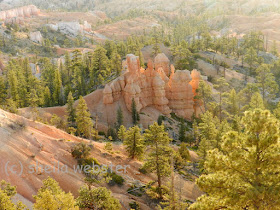 |
| The sun shines on white limestone in Bryce Canyon |
As the sun slowly begins to shine on the hoodoos in the distance, the pure white limestone looks luminous as though it is made of china. Limestone changes color due to the minerals that cause oxidation, but these white hoodoos look beautiful in the early sun.
 |
| White hoodoos in Bryce Canyon |
This close-up of the hoodoos shows the details of what resembles the ruins of an old city on the hillside in the distance. A little imagination and you might see wonderful structures in the amphitheaters, many of them have been named according to legends or history.
 |
| Bright colors of oxidized hoodoos in Bryce Canyon |
The sun is rising quickly now and the shadows and colors are changing so I move on to get as many photos of as I can. The predominant orange colors are a result of iron oxidizing and gives an incredible bright orange to the hoodoos during the sunrise.
 |
| Hoodoos among the trees in Bryce Canyon |
As the sunshine hits these hoodoos, they light up and stand out among the trees. The elevation at Sunrise Point is 2443 meters (8015’) and patches of snow can still be seen. We had great weather conditions for our visit but those who arrived one week later were dealing with colder temperatures and fresh snow.
 |
| Standing among the Bryce Canyon hoodoos |
Many visitors had walked along the path below to get a closer look at the hoodoos as the sun rose. We were here with many others and their cameras also waiting for the sun to give us her glorious glow on the hoodoos. We are on the rim of the plateau on the eastern edge of Paunsaugunt Plateau. This Paiute name means ‘home of the beaver’
 |
| Ever changing colors in the Bryce Canyon sunrise |
The Bryce Canyon Bryce Canyon
 |
| Hoodoos standing tall amid the trees in Bryce Canyon |
We did not allow time to enjoy some of the 80 km.(50 miles) of trails that are throughout the Bryce Canyon National Park
 |
| Shadows and highlights from Sunrise Point in Bryce Canyon |
These hoodoos looked magnificent in the morning sun. The Paiute history says the animal legend people were bad so the Coyote turned them all into rocks and the Paiute translation for Bryce Canyon
There are over 1.5 million people visiting the park every year and I feel fortunate that we were among those in 2012, what an amazing sight to see. Visit more of our Bryce Canyon
